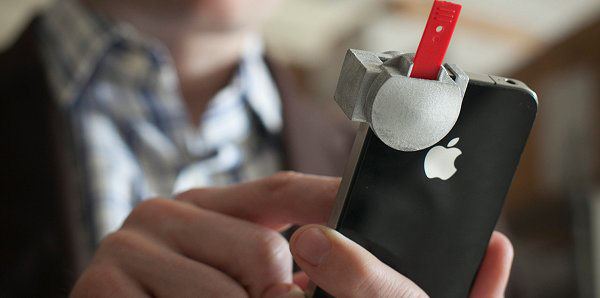NutriPhone dials in fast, affordable health care
By Kate Frazer

The modern medical lab is an amazing place. With just a few drops of blood, technicians can use state-of-the-art equipment to gather complex information about a person’s nutrition, monitor cholesterol levels and screen for diseases.
Such monitoring allows physicians to detect serious health issues before they become worse. The system works well for people with easy access to testing facilities and labs, but what if these resources and infrastructure are simply not available in your city, state or country?
Enter Cornell University's David Erickson, a mechanical engineer, and Saurabh Mehta, a physician and nutrition researcher, who focused on bringing people around the world better health and well-being – all in a smartphone device. Their NutriPhone combines nanofabricated “lab-on-a-chip” technology with new smartphone apps to monitor users’ nutrition, blood and stress.
“Around the time that mobile devices were becoming big we thought, ‘What if someone could have the power of a medical testing laboratory in their pocket?’” said Erickson.
Now their device is poised to transform the way we monitor individual health around the world. The Atkinson Center for a Sustainable Future’s Academic Venture Fund awarded the team seed funding in 2013 to develop a prototype of the device. This grant proved to be the jump-start the project needed: NutriPhone is currently funded by a five-year, $3 million National Science Foundation grant.
Inadequate nutrition is responsible for a variety of health and social problems. Many micronutrient deficiencies are reversible, but no simple system for diagnosing deficiencies and tracking an individual's diet means that most sufferers are unaware they aren't getting the nutrients they need.
“Nutrition is one of the areas we can actually do something about to slow down disease and improve quality of life, but a major bottleneck has been a lack of low-cost tools to determine status,” said Mehta. “Traditionally, people need to have blood drawn, the blood needs to be sent to a lab somewhere else, and the lab has to send it back.” It’s an issue in developing nations – and even here in the United States.
The NutriPhone team knew that making this process more efficient would reduce health care costs and allow people to take charge of their own health.
“But our idea was just a loose concept,” said Erickson. “It’s often the first research dollars that are hardest to get because you are asking a funder to make a bet on an idea that is still being formed and might not work.”
The Academic Venture Fund grant allowed the NutriPhone collaboration to get off the ground, bringing together researchers in several disciplines.
Together, the team focused on developing three specific smartphone applications for nutrition, blood and stress. In addition, the researchers are creating a small device that fits over the smartphone’s powerful megapixel camera, which can analyze small blood samples from test strips. With collaborators in information science, they are also focused on usability, looking at the ways people digest information, the settings where the technology will be used, and who will deploy it.
In many ways NutriPhone is a prime example of “leapfrogging technology” – the idea that areas with less-developed technology or economic bases can move forward rapidly by adopting modern systems and skipping intermediary steps. “In many international settings, NutriPhone could help health care facilities upgrade their capacity and catch up on 50 to 100 years of development, allowing treatment and care to rely on precise, real-time data,” Mehta said.
As a result, NutriPhone has garnered considerable interest.
“When creating a new technology, it’s often about pushing something to consumers before they know they want it, but with NutriPhone it has been much the opposite,” said Erickson.
Research organizations, NGOs involved in program implementation, regulatory agencies, and private multinational corporations have all expressed interest in the device. “It’s in high demand because it fulfills a very clear, very immediate need.”
Kate Frazer is a freelance journalist working with the Atkinson Center for a Sustainable Future.
Media Contact
Get Cornell news delivered right to your inbox.
Subscribe